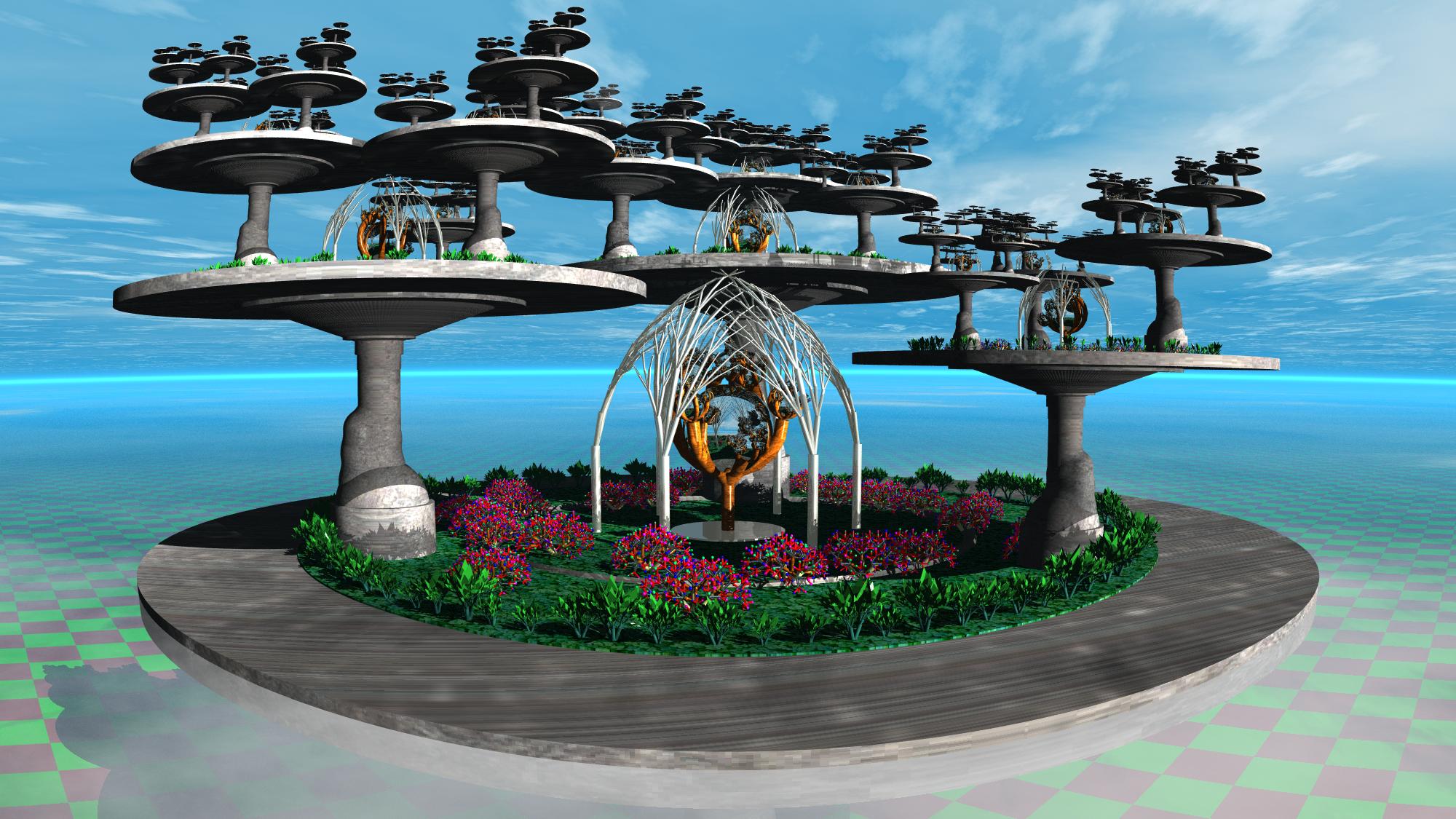 Floating Cities
Floating Cities Floating Cities
Floating CitiesThere is a recent upswing in interest in aquatic FloatingCities - ultra-large ships with a permanent population and economy.
Aquatic FloatingCities already exist. Sometimes rivers (in VietNam? for example) are the only transportation route for backwater (literally) communities. Huge Caravans of boats go up and down the river: trading and fishing, forming an aquatic FloatingCity?. (It's true, I saw it on the Food Network.) -- SeanOleary
A floating garden, or three: ;-)

BuckminsterFuller noted that large GeodesicSpheres - a half mile wide - will actually float in the air due to the temperature differential between air inside and outside. This makes sky-floating cities possible, if not necessarily desirable.
Pros:
OK, we know some of the pros and cons. What about practical application for a sky floating city?
On what is this half-mile diameter figure based? Temperature? Gravity? Air pressure? Would it need to be larger/smaller at higher/lower elevations, temperatures, etc? In Phoenix, the temperature outside reaches as high as 120 degrees Fahrenheit in the summer. Would the interior have to be hotter than that in order to float?
All this talk about floating things reminds me of Titan, a ScienceFiction novel. I forget what actually floated, but I think they were large whale-like things. FloatingCities would also be a good thing if we ever decided to settle Jupiter (ala the old Marvel Comic Guardians of the Galaxy).
Titan by JohnVarley? was part of the Titan, Wizard, Demon trilogy. Titan concerned Gaea, an intelligent rotating kind of wheel where people and critters lived on the interior of the "innertube". Dunno if this was what you were thinking of though. -- AndyPierce
The thing about colonizing gas giants always struck me as missing the point. In what sense are you actually living on the planet? What benefit do you get from it that you wouldn't get from a station in orbit, geosynch or otherwise? It's not as if you can go outside. I suppose having a horizon is nice aesthetically. I note that it would have to be constructed in space: even if you could somehow build it to withstand liftoff from a planet's surface, you probably couldn't get enough energy in one launch, and if you had a steel plant in microgravity you could avoid that expense altogether. Which is doubly nice, because massive structures are actually easier to build in space (less scaffolding...), but you'll need an awful lot of infrastructure before you can even think about tackling the hard problems, which implies that by the time domes are feasible, space stations will be a technology already well understood, whereas the domes would be something with new dangers and no new benefits. -- DanielKnapp
The benefits are two-fold. First, living in a gravity well, hence not messing up the human metabolism nor needing to accelerate the station. Second, access to atmospheric gases.
See also CriticalPath
Floating cities will never work, for the same reason large scale use of dirigibles is impractical. It has to do with a phenomenon called the weather. Unless you can somehow float above it, but the air gets pretty thin up there!
Proposition :-)
Just connect the floating cities to the Invulnerable SpaceElevator at different elevations, it would give another much more practical reason for its existence than going 25000 miles to visit a space station tied to an asteroid somehow captured and forced into a geosynchronous orbit by the mass of the elevator. Certainly "spaced out" earthlings will feel comfortable in these otherwise rather unnatural surroundings. My concern is that some of the residents might consider it more like a prison than a paradise. It would also provide a place of residence for the maintenance crews for the SpaceElevator.
People with the financial means to support such a scheme would insist that the cities be insured and stable, so if they were ever built, no concern for personal security and safety would be an issue. Certain other money-making enterprises would arise in the opportunity to ship the hundreds and thousands of semi-trucks full of supplies and utilities to the city. The stockholders of the CorporateGovernment which would be introduced by such arrangements would be assured of guaranteed returns, not subject to the ups and downs usually associated with risky investments.
They'd just be subject to much more literal ups and downs.
One step further than this and we have "CitiesInFlight?" as in the JamesBlish? novel.
...My vague memory is that Cities in Flight got less and less interesting as it went along, but still, it's an epic tale. And everyone should know about "spindizzies". :-)
 EditText of this page
(last edited September 30, 2006)
or FindPage with title or text search
EditText of this page
(last edited September 30, 2006)
or FindPage with title or text search